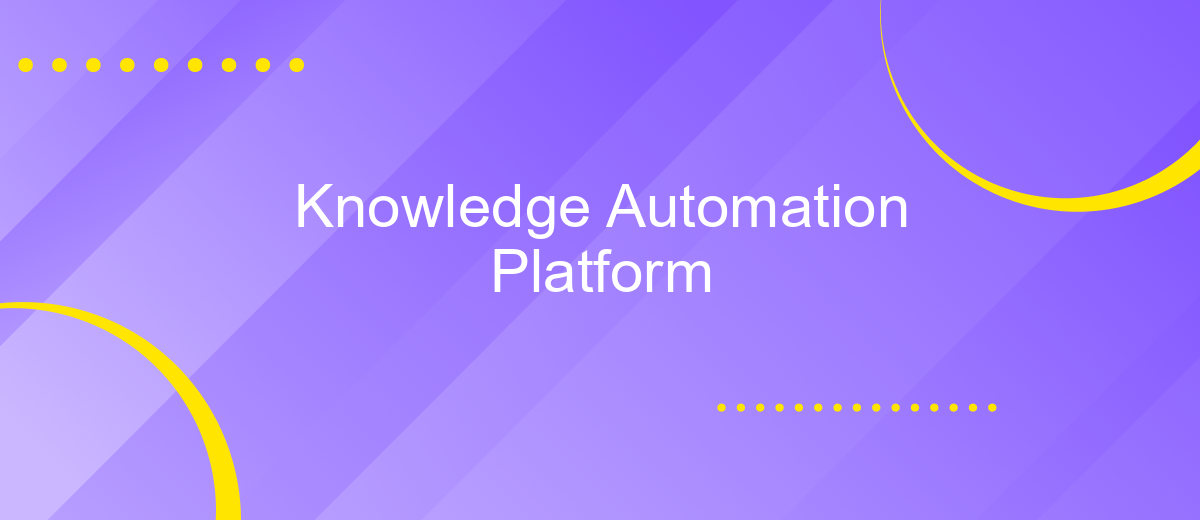Knowledge Automation Platform
In today's fast-paced digital world, businesses are constantly seeking innovative solutions to enhance efficiency and productivity. A Knowledge Automation Platform offers a transformative approach by streamlining information management and automating routine tasks. By leveraging advanced technologies such as artificial intelligence and machine learning, this platform empowers organizations to harness their collective knowledge, improve decision-making, and drive sustainable growth, ultimately revolutionizing the way they operate and compete in the market.
Introduction
The rapid advancement of technology has ushered in a new era of efficiency and precision in various business processes. A Knowledge Automation Platform (KAP) represents a significant leap forward in automating decision-making and knowledge management. By leveraging artificial intelligence and machine learning, these platforms streamline complex workflows, reduce human error, and enhance productivity. KAPs are becoming indispensable tools for organizations aiming to maintain a competitive edge in a fast-paced digital landscape.
- Automates repetitive tasks, freeing up human resources for strategic initiatives.
- Integrates seamlessly with existing systems, ensuring smooth transitions and minimal disruptions.
- Enhances decision-making by providing data-driven insights and recommendations.
- Facilitates knowledge sharing and collaboration across departments.
- Continuously learns and adapts to changing business environments.
As businesses strive to harness the full potential of their data, the implementation of a Knowledge Automation Platform becomes increasingly crucial. These platforms not only optimize operational efficiency but also empower organizations to make informed decisions swiftly. By adopting KAPs, companies can unlock new opportunities for growth and innovation, ensuring they remain agile and resilient in an ever-evolving marketplace.
Knowledge Automation Platform Overview

The Knowledge Automation Platform (KAP) is a transformative tool designed to streamline and enhance the management of information within an organization. By automating repetitive tasks and processes, KAP enables businesses to focus on strategic decision-making and innovation. The platform integrates advanced technologies such as artificial intelligence and machine learning to deliver insights and recommendations, thus optimizing the use of knowledge assets. Its user-friendly interface and customizable features make it accessible to various industries, ensuring that knowledge is efficiently captured, stored, and utilized.
A key feature of KAP is its ability to seamlessly integrate with existing systems and applications, enhancing the flow of information across different platforms. For instance, using services like ApiX-Drive, organizations can automate data transfer between their CRM, ERP, and other essential tools without manual intervention. This integration capability not only saves time but also reduces the risk of errors, ensuring data consistency and accuracy. Ultimately, a Knowledge Automation Platform empowers organizations to harness their knowledge resources effectively, driving productivity and fostering a culture of continuous improvement.
Benefits of Knowledge Automation

Implementing a Knowledge Automation Platform can significantly enhance organizational efficiency by streamlining information management processes. By automating the collection, organization, and dissemination of knowledge, businesses can reduce manual workloads and minimize human errors, allowing employees to focus on more strategic tasks.
- Increased productivity: Automating repetitive tasks frees up valuable time for employees to engage in more meaningful work.
- Enhanced decision-making: With immediate access to accurate and up-to-date information, teams can make informed decisions quickly.
- Cost savings: Reducing the need for manual data handling decreases operational costs and improves resource allocation.
- Improved collaboration: Knowledge automation fosters better communication and collaboration across departments by ensuring everyone has access to the same information.
- Scalability: As organizations grow, automated systems can easily adapt and scale to meet increasing demands without compromising efficiency.
Overall, a Knowledge Automation Platform empowers organizations to harness the full potential of their information assets. By optimizing knowledge processes, companies can drive innovation, improve customer satisfaction, and maintain a competitive edge in an ever-evolving marketplace.
Key Features of a Knowledge Automation Platform

A Knowledge Automation Platform (KAP) is a transformative tool designed to streamline and enhance the management of organizational knowledge. By automating repetitive tasks and enabling seamless information flow, KAPs empower businesses to operate more efficiently and intelligently. These platforms are essential in today's data-driven world, where the ability to quickly access and utilize information can significantly impact a company's success.
One of the primary benefits of a KAP is its ability to integrate with existing systems, providing a unified interface for knowledge management. This integration facilitates better communication and collaboration across teams, ensuring that critical insights are easily accessible to those who need them. Additionally, KAPs leverage advanced technologies such as artificial intelligence and machine learning to continuously improve and adapt to organizational needs.
- Automated knowledge capture and organization
- Seamless integration with existing systems
- AI-driven insights and recommendations
- Enhanced collaboration tools
- Scalable architecture to support growth
In conclusion, a Knowledge Automation Platform is an indispensable asset for modern enterprises seeking to optimize their knowledge management processes. By automating routine tasks and providing intelligent insights, KAPs enable organizations to focus on strategic initiatives and drive innovation.


How to Implement a Knowledge Automation Platform
Implementing a Knowledge Automation Platform begins with a thorough assessment of your organization's knowledge management needs. Identify key areas where automation can enhance efficiency, such as document management, data retrieval, and employee onboarding. Once these areas are pinpointed, select a platform that aligns with your objectives and offers scalability. Ensure the platform supports integration with existing tools and systems to streamline workflows and enhance data accessibility.
Next, focus on integrating the platform with your current software ecosystem. Tools like ApiX-Drive can facilitate seamless integration by connecting various applications without the need for extensive coding. This service allows you to automate data transfer and synchronize information across platforms, ensuring consistency and accuracy. Additionally, train your team to effectively utilize the platform, emphasizing its benefits in reducing manual tasks and improving knowledge sharing. Regularly monitor and evaluate the platform's performance, making necessary adjustments to optimize its functionality and maintain alignment with organizational goals.
FAQ
What is a Knowledge Automation Platform?
How can a Knowledge Automation Platform benefit my organization?
What types of tasks can be automated with a Knowledge Automation Platform?
How does integration work with a Knowledge Automation Platform?
What should I consider when choosing a Knowledge Automation Platform?
Routine tasks take a lot of time from employees? Do they burn out, do not have enough working day for the main duties and important things? Do you understand that the only way out of this situation in modern realities is automation? Try Apix-Drive for free and make sure that the online connector in 5 minutes of setting up integration will remove a significant part of the routine from your life and free up time for you and your employees.

